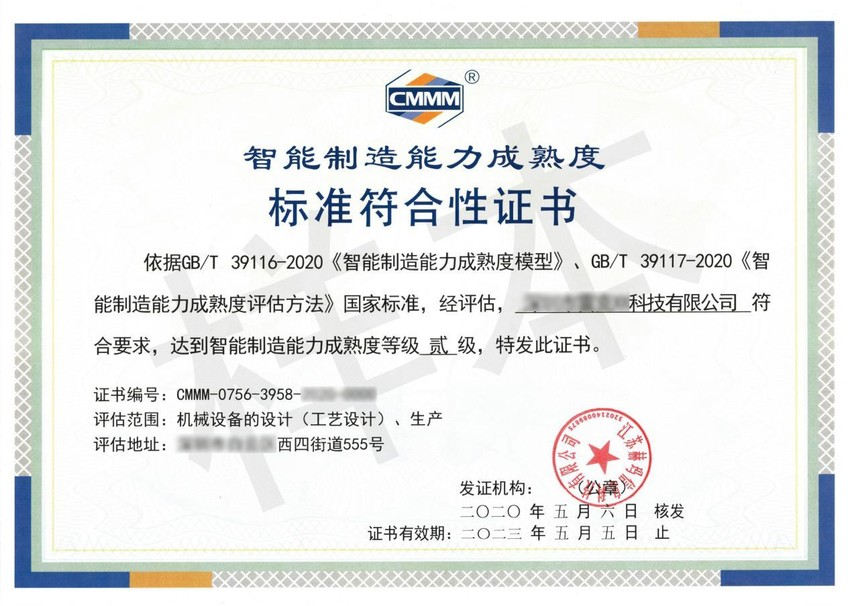
 Professional services are guaranteed
Professional services are guaranteed One on one full process guidance
One on one full process guidance Efficient and fast experience
Efficient and fast experienceOfficial definition: CMMM is the China Manufacturing Maturity Model (CMMM), a national standard jointly developed by the China Electronics Standardization Institute (CESI) and the Ministry of Industry and Information Technology (MIIT) (GB/T 39116-2020).
Core objective:
Addressing the core pain point: Resolving the common dilemma of "unclear direction, unclear path, and unpredictable effects" in the intelligent transformation of enterprises.
Building a unified language: Establishing a unified standard for evaluating intelligent manufacturing capabilities across industries and regions, promoting industry chain collaboration.
Supporting national strategy: providing objective basis for the government to implement precise policies (such as selecting demonstration factories and allocating special funds), and promoting the optimization of industrial resource allocation.
Benchmarking international frontiers: Achieving compatibility with international standards (such as IEC 62264, RAMI 4.0) and helping Chinese enterprises integrate into the global intelligent manufacturing system.
Strategic Value: CMMM is a key infrastructure for implementing the national manufacturing power strategy, providing enterprises with a scientific and systematic intelligent manufacturing capability evaluation method, helping them accurately position their development level, optimize resource allocation, and achieve intelligent upgrading. This provides essential evaluation criteria for enterprises to benchmark against international advanced levels and participate in national level intelligent manufacturing projects
The Capability Maturity Model for Intelligent Manufacturing (CMMM) is a systematic methodology aimed at helping businesses assess the current status of their intelligent manufacturing capabilities and provide clear paths for improvement. The core framework of CMMM consists of the following key components:
1. Five maturity levels
CMMM divides the level of enterprise intelligent manufacturing from low to high into five levels, each corresponding to different capability characteristics and requirements:

2. Four ability elements
CMMM focuses on four core competency elements to ensure that enterprises consider the coordinated development of various links in the industrial chain when promoting intelligent manufacturing:
Personnel: including two competency domains of organizational strategy and personnel skills, emphasizing the need for enterprises to develop clear intelligent manufacturing strategies and possess corresponding personnel skills.
Technology: covering three domains of data, integration, and information security, requiring enterprises to have corresponding capabilities in data collection, system integration, and information security.
Resources: including two capability domains: equipment and network, focusing on the intelligence level of key equipment and the construction of network infrastructure in enterprises.
Manufacturing: involves five capability domains of design, production, logistics, sales, and service, requiring enterprises to achieve intelligence in product design, production process, logistics management, sales and service, and other aspects.
3. Twenty ability subdomains
In order to more finely characterize the various capability requirements of enterprises in intelligent manufacturing, CMMM is further subdivided into twenty capability subdomains.
These subdomains cover multiple levels such as resource elements, interconnectivity, system integration, data analysis, information security, and organizational culture, collectively forming a complete capability system for intelligent manufacturing.
For example:
Data subdomain: Enterprises are required to adopt sensing technology to achieve automatic collection of key link data and establish unified data encoding and exchange rules.
Integration subdomain: Enterprises are required to form a complete system integration architecture to achieve integration between equipment, control systems, and software systems.
Design subdomain: Emphasize the digitization and intelligence of product design, such as using computer-aided design (CAD), simulation technology, etc.
(I.) The application value of CMMM
1. Balanced development of all-round capabilities
CMMM not only focuses on the manufacturing process of product realization (such as design, production, logistics, sales, and service), but also covers organizational, resource, and technical aspects. Its 20 capability subdomains have put forward construction requirements for intelligent control of various business operations of enterprises, emphasizing the balanced development of multi-faceted capabilities of enterprises.
By avoiding the "barrel effect" caused by single point capability enhancement, CMMM can help enterprises achieve long-term stable development.
2. Policy support and resource acquisition
CMMM certification has been included as a core indicator in multiple national and local policies, such as the "National Intelligent Manufacturing Pilot Demonstration Project" and the "High Quality Development of Manufacturing Industry Special Project". Enterprises certified by CMMM are given priority in obtaining financial subsidies, tax incentives, project application qualifications, etc., such as up to 30% of the project investment for intelligent manufacturing transformation special funds.
3. Enhance market competitiveness
By quantifying indicators, enterprises can achieve precise management, reduce operating costs, and improve production efficiency. For example, after obtaining CMMM L4 certification, a household appliance company reduced equipment downtime by 45% and operation and maintenance costs by 28%.
CMMM also helps companies build predictive maintenance models, optimize supply chain management, improve inventory turnover and R&D cycles.
4. Assist in digital transformation
CMMM provides enterprises with a clear path for intelligent development, avoiding blind investment and the problem of technology "unfinished buildings". Its hierarchical capability model (L1-L5) provides enterprises with a complete roadmap of "diagnosis planning implementation".
By promoting collaboration among various departments within the enterprise, breaking down information silos, and achieving data sharing and business integration.
5. Intelligent manufacturing talent cultivation
CMMM provides a solution for manufacturing enterprises to cultivate "pillar like" talents. At present, more than 4000 students from 1200 manufacturing enterprises across the country are systematically learning the application methods of CMMM, covering more than 30 industries such as equipment manufacturing and electronic information.
(II.) Applicable scenarios of CMMM
1. Internal applications within the enterprise
Self evaluation and diagnosis: Enterprises can conduct self diagnosis through the intelligent manufacturing evaluation public service platform to identify their own shortcomings in intelligent manufacturing capabilities.
Develop strategic planning: CMMM provides enterprises with a gradual upgrade path from automation and standardization foundations to business model innovation, helping them anchor business goals and efficiently implement intelligent construction.
Optimizing production processes: With the guidance of CMMM, enterprises can optimize their production processes, improve production efficiency and product quality.
2. Application of suppliers and investors
Suppliers: Through CMMM, suppliers can better grasp the needs of Party A, clarify the technical implementation path, and optimize solutions.
Investor: The investor can evaluate the intelligent manufacturing level of the enterprise through CMMM, identify excellent enterprises, and grasp the development trend of intelligent manufacturing.
3. Industry and regional applications
Industry application: CMMM is suitable for manufacturing enterprises of different production organization modes, industries, and scales.
For example, typical scenarios such as discrete process digital design, self-organizing flexible production, and agile supply chain can be evaluated and optimized through CMMM.
Regional application: Local governments promote the development of intelligent manufacturing for regional enterprises by adopting CMMM standards. For example, provinces and cities such as Jiangsu, Shandong, and Guangdong encourage enterprises to apply CMMM through technological transformation subsidies, corresponding level subsidies, and other means.
4. Construction of intelligent manufacturing engineering
CMMM has proposed construction requirements based on three levels: intelligent workshop, intelligent factory, and intelligent supply chain, to help enterprises achieve different business goals and objectives.
Through CMMM, enterprises can avoid the "pilot trap", avoid detours, and accurately implement intelligent manufacturing projects
National endorsement: National standard (GB/T 39116-2020), jointly promoted by multiple ministries such as the Ministry of Industry and Information Technology and the State owned Assets Supervision and Administration Commission.
Complete system: covering the entire value chain of "strategy personnel technology process resources", with rigorous logic and no blind spots.
Strong operability: Supporting standards such as "Evaluation Methods" (GB/T 39117-2020) and "Terminology" (GB/T 39118-2020), providing implementation guidelines.
International compatibility:
Consistent with the system integration concept of IEC 62264 (Enterprise Control System Integration)
Deep integration with German RAMI 4.0 in layered architecture
Absorbing the data-driven thinking of the intelligent manufacturing ecosystem in the United States
Ecological perfection: Officially authorized evaluation agencies and professional consulting service networks are spread throughout the country
(I.) Application Materials for CMMM Certification
1. Basic information of the enterprise:
A copy of the business license;
Company profile, including organizational structure, business scope, personnel size, etc;
Enterprise intelligent manufacturing development plan and strategy.
2. Management documents related to intelligent manufacturing:
Intelligent Manufacturing Project Management System;
Data management and security regulations;
Management Measures for Technological Innovation.
3. Production and operation related materials:
Production process flow description;
Equipment list and maintenance records;
Quality control process and inspection report.
4. Information and digital system materials:
List of various information systems used by enterprises (such as ERP, MES, PLM, etc.);
System architecture diagram and functional description;
System operation and data recording.
5. Materials related to technological innovation:
R&D project list and achievement report;
Proof of intellectual property rights such as patents and technical know-how;
Cooperation agreements with external research institutions.
6. Personnel related information:
Job description for positions related to intelligent manufacturing;
Employee training plan and records;
Qualification certificates for key position personnel.
7. Financial data:
The investment budget and actual expenditure of projects related to intelligent manufacturing;
Cost benefit analysis report.
8. Supply Chain Management Information:
Supplier list and evaluation records;
Procurement process and logistics management process.
9. Performance evaluation data:
Performance indicators data on production efficiency, quality improvement, cost reduction, and other aspects;
Customer satisfaction survey results.
10. Cases and practical evidence:
Case introduction of successful application of intelligent manufacturing;
Proof of awards or honors for related projects.
11. Industry benchmarking analysis:
Comparative analysis report with peers in the field of intelligent manufacturing.
12. Other relevant supporting documents:
Relevant documents of government supported projects;
Relevant materials for participating in the formulation of industry standards.
(II.) CMMM certification application conditions
1. Applicant:
The applying enterprise should be an independent legal entity;
Organizations include independent legal entities and non independent legal entities (branches, business units, specific workshops/factories).
2. Enterprise scale:
Manufacturing enterprises of any scale can apply, including enterprises above designated size and small and medium-sized enterprises.
3. Industry attributes:
The applying enterprise should be within the manufacturing industry scope specified in the national standard GB/T 4754-2017 "Classification of National Economic Industries";
Targeting manufacturing enterprises without industry constraints.
4. Business scope:
Enterprises should focus on production and manufacturing as their main business, covering one or more stages of the product lifecycle such as design, production, logistics, sales, and services.
5. Fundamentals of Intelligent Manufacturing:
Enterprises should have a certain foundation in informatization and digitization, and have practical application of new generation information technology in their production and operation;
For example, enterprises should have a certain foundation in information systems, such as ERP, MES, PLM, etc.
6. Personnel requirements:
Enterprises applying for Level 3 evaluation must have at least one internal staff member participate in the "Intelligent Manufacturing Capability Maturity Model" training and pass the exam;
Enterprises applying for Level 4 or above assessment must ensure that two internal personnel of the enterprise participate in training and pass the examination.
(III.) Precautions
Material preparation: It is recommended that companies communicate fully with certification agencies when preparing materials to ensure accurate and complete information is provided.
Evaluation level selection: Enterprises can apply for a lower level for the first evaluation, and can apply for a higher level one year later.
Data authenticity: If data fraud is found, the certification qualification will be cancelled (no reapplication within 3 years)











Wechat ID:Siterui888888
Add a wechat friend to get free plans and quotations


 Contact
Contact




 定制化解决方案
定制化解决方案 专业咨询指导
专业咨询指导 透明化服务
透明化服务 长期顾问式合作
长期顾问式合作